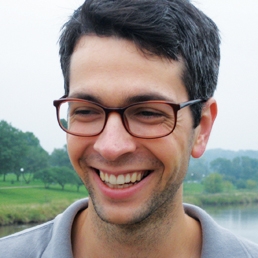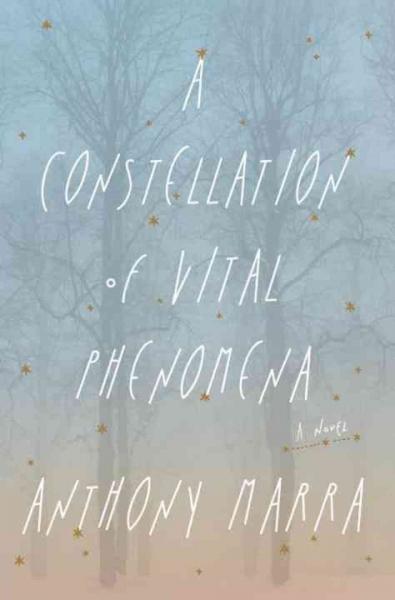- Categories:
A Q&A With Anthony Marra, Author of May’s #1 Indie Next List Pick
 The #1 Indie Next List Pick for May is Anthony Marra’s A Constellation of Vital Phenomena (Hogarth), which takes place in 2004 in war-torn Chechnya. The novel opens with eight-year-old Havaa watching Russian soldiers abduct her father who is accused of aiding Chechen rebels. Seeking refuge, Havaa’s neighbor Akhmed brings her to an abandoned hospital where they find Sonja, an overworked doctor who treats the wounded. Over the course of five days, a pattern of connections is revealed that weaves together the pasts of these three unlikely companions and unexpectedly decides their fates.
The #1 Indie Next List Pick for May is Anthony Marra’s A Constellation of Vital Phenomena (Hogarth), which takes place in 2004 in war-torn Chechnya. The novel opens with eight-year-old Havaa watching Russian soldiers abduct her father who is accused of aiding Chechen rebels. Seeking refuge, Havaa’s neighbor Akhmed brings her to an abandoned hospital where they find Sonja, an overworked doctor who treats the wounded. Over the course of five days, a pattern of connections is revealed that weaves together the pasts of these three unlikely companions and unexpectedly decides their fates.
In nominating a Constellation of Vital Phenomena for the Indie Next List, Anderson McKean of Alabama’s Page & Palettte said that Marra “expertly balances the pain and suffering inflicted during the Chechen conflict with exquisite moments of loyalty, sacrifice, humility, and enduring love.”
Marra is the recipient of a 2011 – 2013 Wallace Stegner Fellowship at Stanford University and a 2012 Whiting Writers’ Award. His short story “Chechnya” won a 2010 Pushcart Prize and the 2010 Narrative Prize. A Constellation of Vital Phenomena is his debut novel.
 BTW: What initially drew you to Chechnya as a subject, as it is a place that –– until the recent bombings in Boston –– hasn’t been on the radar of most Americans? Though the book touches on Chechen politics and religion, it is a story about everyday people, who seem to represent humanity as a whole.
BTW: What initially drew you to Chechnya as a subject, as it is a place that –– until the recent bombings in Boston –– hasn’t been on the radar of most Americans? Though the book touches on Chechen politics and religion, it is a story about everyday people, who seem to represent humanity as a whole.
Anthony Marra: Like all Americans, I watched the tragedy unfold in Boston with horror and sadness. My thoughts and prayers are with the victims and their families. It deeply upsets me that Chechnya’s presence in the news is in relation to these crimes.
I became interested in Chechnya as a college student in St. Petersburg in 2007. I began reading various histories and journalistic accounts and quickly became fascinated, largely because it was a region I hadn’t previously known much about. It’s a place that has inspired writers like Tolstoy, Pushkin, and Lermontov, and has a rich history and culture. I had read, and later heard for myself while traveling through Chechnya, stories of ordinary people persisting in extraordinary circumstances as they recovered what had been lost and preserved what remained. They were the kind of stories that demanded to be brought to life through fiction, and they are the kind of stories at the heart of Constellation.
BTW: Chechnya and Russia have such a tense and complicated history. Was it at all intimidating to write about this conflict and culture as an American? What did your research entail? It seems that you included just enough information to provide context, without giving readers a history lesson. How did you find that balance?
AM: I worked on the novel under the assumption that the reader would have no prior knowledge of the region. As a writer, you always walk a fine line when depicting a place unfamiliar to your reader. A certain amount of contextual information is necessary, but it’s jarring if that information is presented indulgently or in a way that seems inconsistent with the characters’ understanding of their world. This came up when I wanted to describe the geographical dimensions of Chechnya. It wouldn’t have sounded right if a character were walking down the street and suddenly began thinking about geography. But when a character sees a map of Chechnya for the first time (they were prohibited during the Soviet years) that contextual information is wed to his emotional reaction at first seeing the shape of his homeland.
The character of Khassan was a particularly helpful conduit to provide context. He spends his entire career writing an epic 3,000-page history of Chechnya. But every time he is close to publication, a shift in the prevailing political winds requires him to go back and rewrite it from the beginning. In that way, the history of the publication of the history book, more so than the history book itself, provides repeated moments when important contextual information is given to the reader through Khassan’s emotional experience.
My own research mainly revolved around nonfiction works on Chechnya, and eventually I had the opportunity to visit Chechnya myself. The novel is about civilians, not soldiers, and those are the stories I most wanted to hear and most wanted to tell.
BTW: Throughout the course of the novel, we see the world from each character’s perspective and discover how their pasts have influenced their fates. The characters run the gamut –– from Ramzan, a gun-runner-turned-informant, to Havaa, a young girl who remains in hiding after her father was taken and their house burned down. How did you get into each of their heads and provide a human quality to even the most unsympathetic of characters?
AM: The cast began as the kind of archetypes found in most regions that have experienced war: orphans, war surgeons, black market men, informers, and refugees, all of whom seek to transcend their circumstances by preserving what means the most to them, be it their family, their faith, or themselves. Each came to life as individual characters often through a small detail. For Dokka, it came in his ability to peel a plum in a single unbroken coil. For Khassan, it came in his devotion to a pack of stray dogs that had belonged to the neighbors his son had informed on. With each successive draft of Constellation, the narrator became larger, more omniscient, more inclusive, and more generous. Eventually the narrator’s reach was long enough to inhabit the minds of characters that don’t appear on the page for longer than a sentence or two.
Readers are very perceptive. If the author doesn’t care about the characters, chances are a reader won’t care either. I cared about these characters and I tried to convey that care by rendering their lives and the choices they make without judgment.
BTW: Your short story “Chechnya,” on which Constellation is based, received both a Pushcart Prize and the Narrative Prize in 2010. There are many similar elements, down to the characters’ names. What made you decide to turn it into a full-length novel, and what was the process like? Was it always a bigger story in your mind?
AM: After I finished the story, the characters continued speaking to me. I felt there was a larger story there, something much more expansive than 25 pages could contain. In that sense, the short story provided a spine that I built out from. But in terms of character, language, and the complexity of the interwoven stories, the novel has felt like a very different animal to me.
BTW: Your novel casts a light on so many parts of life during war. Why was it important to include moments of humor, whimsy, and beauty despite the bleak chaos of wartime? Are these hopeful moments a realistic example of Chechens’ outlook during such a difficult time?
AM: Humor, whimsy, and beauty don’t disappear during difficult times. If anything, they become more necessary. One of the books I thought of when working on mine was City of Thieves by David Benioff. The Siege of Leningrad was a brutal atrocity, yet he conveys the suffering of those who endured it without ever forsaking hope, humor, love, or even joy. When I traveled to Chechnya, I met a man in the city of Urus-Marten who had in his backyard built a private village based on the hamlet where he had grown up, eventually turning it into a free museum for anyone interested in traditional Chechen culture and history. It’s that sense of salvage, of recovery, that underlies my characters and their stories.

